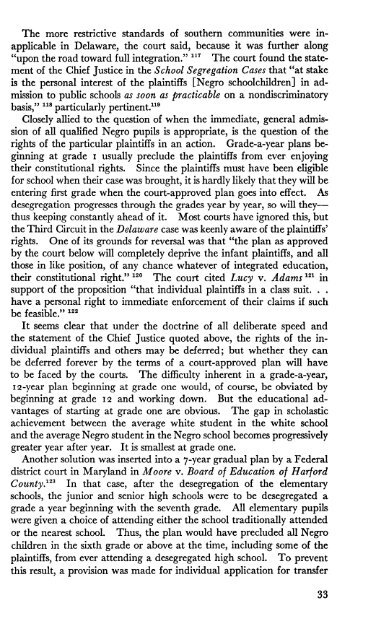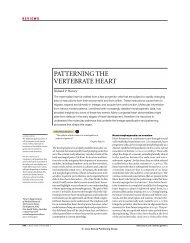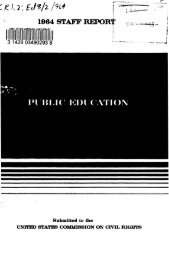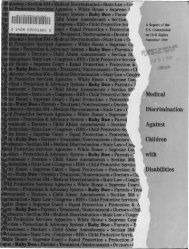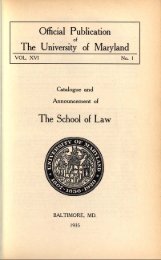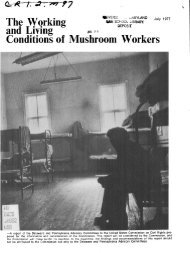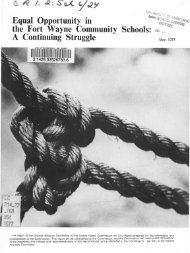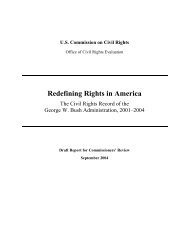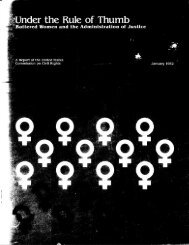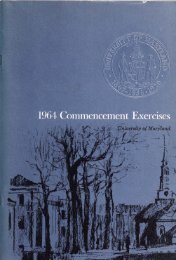1961 US Commission on Civil Rights Report Book 2 - University of ...
1961 US Commission on Civil Rights Report Book 2 - University of ...
1961 US Commission on Civil Rights Report Book 2 - University of ...
Create successful ePaper yourself
Turn your PDF publications into a flip-book with our unique Google optimized e-Paper software.
The more restrictive standards <strong>of</strong> southern communities were inapplicable<br />
in Delaware, the court said, because it was further al<strong>on</strong>g<br />
"up<strong>on</strong> the road toward full integrati<strong>on</strong>." 117 The court found the statement<br />
<strong>of</strong> the Chief Justice in the School Segregati<strong>on</strong> Cases that "at stake<br />
is the pers<strong>on</strong>al interest <strong>of</strong> the plaintiffs [Negro schoolchildren] in admissi<strong>on</strong><br />
to public schools as so<strong>on</strong> as practicable <strong>on</strong> a n<strong>on</strong>discriminatory<br />
basis," 118 particularly pertinent. 119<br />
Closely allied to the questi<strong>on</strong> <strong>of</strong> when the immediate, general admissi<strong>on</strong><br />
<strong>of</strong> all qualified Negro pupils is appropriate, is the questi<strong>on</strong> <strong>of</strong> the<br />
rights <strong>of</strong> the particular plaintiffs in an acti<strong>on</strong>. Grade-a-year plans beginning<br />
at grade i usually preclude the plaintiffs from ever enjoying<br />
their c<strong>on</strong>stituti<strong>on</strong>al rights. Since the plaintiffs must have been eligible<br />
for school when their case was brought, it is hardly likely that they will be<br />
entering first grade when the court-approved plan goes into effect. As<br />
desegregati<strong>on</strong> progresses through the grades year by year, so will they—<br />
thus keeping c<strong>on</strong>stantly ahead <strong>of</strong> it. Most courts have ignored this, but<br />
the Third Circuit in the Delaware case was keenly aware <strong>of</strong> the plaintiffs'<br />
rights. One <strong>of</strong> its grounds for reversal was that "the plan as approved<br />
by the court below will completely deprive the infant plaintiffs, and all<br />
those in like positi<strong>on</strong>, <strong>of</strong> any chance whatever <strong>of</strong> integrated educati<strong>on</strong>,<br />
their c<strong>on</strong>stituti<strong>on</strong>al right." 12 ° The court cited Lucy v. Adams 121 in<br />
support <strong>of</strong> the propositi<strong>on</strong> "that individual plaintiffs in a class suit. . .<br />
have a pers<strong>on</strong>al right to immediate enforcement <strong>of</strong> their claims if such<br />
be feasible." 122<br />
It seems clear that under the doctrine <strong>of</strong> all deliberate speed and<br />
the statement <strong>of</strong> the Chief Justice quoted above, the rights <strong>of</strong> the individual<br />
plaintiffs and others may be deferred; but whether they can<br />
be deferred forever by the terms <strong>of</strong> a court-approved plan will have<br />
to be faced by the courts. The difficulty inherent in a grade-a-year,<br />
12-year plan beginning at grade <strong>on</strong>e would, <strong>of</strong> course, be obviated by<br />
beginning at grade 12 and working down. But the educati<strong>on</strong>al advantages<br />
<strong>of</strong> starting at grade <strong>on</strong>e are obvious. The gap in scholastic<br />
achievement between the average white student in the white school<br />
and the average Negro student in the Negro school becomes progressively<br />
greater year after year. It is smallest at grade <strong>on</strong>e.<br />
Another soluti<strong>on</strong> was inserted into a y-year gradual plan by a Federal<br />
district court in Maryland in Moore v. Board <strong>of</strong> Educati<strong>on</strong> <strong>of</strong> Harford<br />
County. 123 In that case, after the desegregati<strong>on</strong> <strong>of</strong> the elementary<br />
schools, the junior and senior high schools were to be desegregated a<br />
grade a year beginning with the seventh grade. All elementary pupils<br />
were given a choice <strong>of</strong> attending either the school traditi<strong>on</strong>ally attended<br />
or the nearest school. Thus, the plan would have precluded all Negro<br />
children in the sixth grade or above at the time, including some <strong>of</strong> the<br />
plaintiffs, from ever attending a desegregated high school. To prevent<br />
this result, a provisi<strong>on</strong> was made for individual applicati<strong>on</strong> for transfer<br />
33


